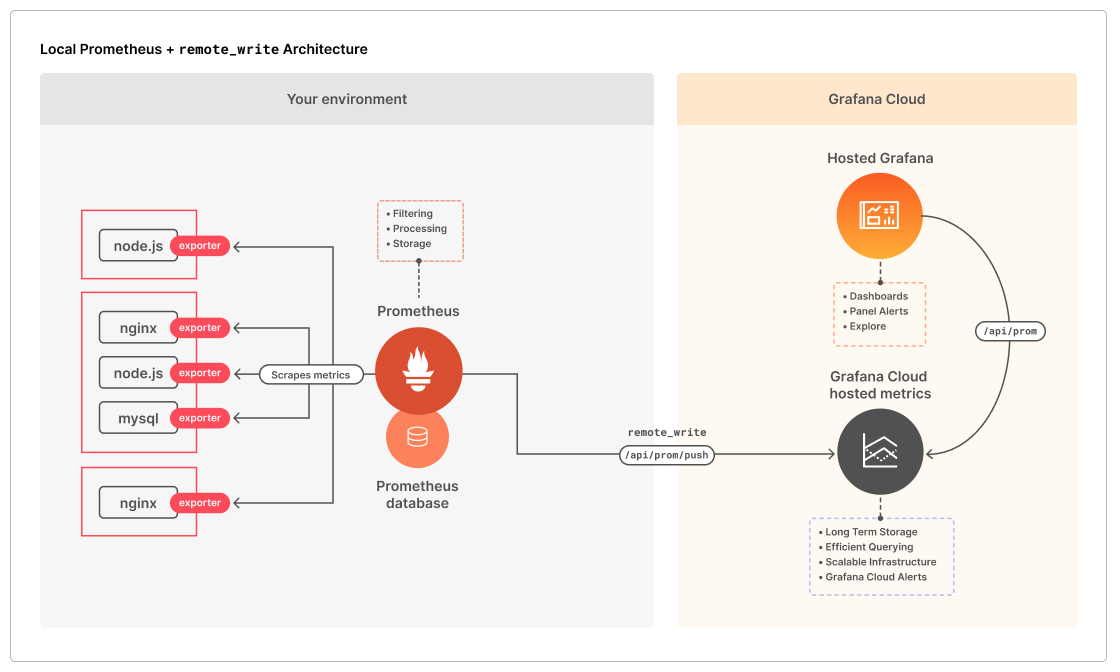Send metrics data from Prometheus
To get Prometheus metrics into Grafana Cloud, configure Prometheus to push scraped samples using remote_write. remote_write allows you to forward scraped samples to compatible remote storage endpoints. To learn more, refer to the Prometheus remote_write documentation.
Send data from a Prometheus instance
To send Prometheus data to Grafana Cloud Metrics you will need a running Prometheus instance in your environment, as in the following diagram:

Add the following remote_write snippet to your Prometheus configuration file (often prometheus.yml). You can find the /api/prom/push URL, username, and password for your metrics endpoint by clicking on Details in the Prometheus card of the Cloud Portal:
remote_write:
- url: <Your Metrics instance remote_write endpoint>
basic_auth:
username: <Your Metrics instance ID>
password: <Your Cloud Access Policy token>Send Prometheus native histograms
You can send Prometheus native histograms to Grafana Cloud. For more information, refer to Send and query native histograms.
Send data from multiple Prometheus instances
When sending metrics from multiple Prometheus instances, you can use the external_labels parameter to label time series data with an instance identifier. Append any external_labels to the global section of your Prometheus configuration file. You can find the /api/prom/push URL, username, and password for your metrics endpoint by clicking on Details in the Prometheus card of the Cloud Portal:
First Prometheus instance:
global:
external_labels:
origin_prometheus: prometheus01
remote_write:
- url: <Your Metrics instance remote_write endpoint>
basic_auth:
username: <Your Metrics instance ID>
password: <Your Cloud Access Policy token>Second Prometheus instance:
global:
external_labels:
origin_prometheus: prometheus02
remote_write:
- url: <Your Metrics instance remote_write endpoint>
basic_auth:
username: <Your Metrics instance ID>
password: <Your Cloud Access Policy token>Send data from multiple high-availability Prometheus instances
If you’re shipping data to Grafana Cloud Metrics from multiple Prometheus instances in a high-availability (HA) configuration, you should use the cluster and __replica__ labels to deduplicate data received at the Grafana Cloud Metrics endpoint. Add these to the external_labels section in your Prometheus configuration file. You can find the /api/prom/push URL, username, and password for your metrics endpoint by clicking on Details in the Prometheus card of the Cloud Portal:
First HA Prometheus instance:
global:
external_labels:
cluster: prom-team1
__replica__: replica1
remote_write:
- url: <Your Metrics instance remote_write endpoint>
basic_auth:
username: <Your Metrics instance ID>
password: <Your Cloud Access Policy token>Second HA Prometheus instance:
global:
external_labels:
cluster: prom-team1
__replica__: replica2
remote_write:
- url: <Your Metrics instance remote_write endpoint>
basic_auth:
username: <Your Metrics instance ID>
password: <Your Cloud Access Policy token>Use the cluster label to identify the HA Prometheus cluster shipping data to Grafana Cloud Metrics. Set the __replica__ label to a unique value within the HA Prometheus cluster. It drops when Grafana Cloud Metrics deduplicates and ingests the data.
To learn more about how deduplication works, refer to Configure Grafana Mimir high-availability deduplication in the Grafana Mimir documentation.
To learn more about Prometheus configuration parameters, refer to the Prometheus.io Configuration Docs.
The Monitoring a Linux host using Prometheus and Node Exporter provides a complete start to finish example of installing a local Prometheus instance and using remote_write to send metrics from the instance to Grafana Cloud.
Scrape metrics from a Prometheus endpoint
With the Metrics Endpoint integration, you can automate the scraping of any Prometheus-compatible publicly accessible URL. The scraped metrics are then stored in Grafana Cloud, without requiring any additional infrastructure. You can set up multiple configurations, known as “scrape jobs”, to simultaneously monitor multiple URLs.
This method is recommended for serverless environments or platforms that do not provide access to the underlying infrastructure to install monitoring tools.
To learn more about this method, review the Metrics Endpoint integration for Grafana Cloud guide.
Troubleshoot issues
Refer to the following troubleshooting information, as required.
Receive read-only or can’t open file message
These errors suggest that your user lacks the necessary write permissions to edit the prometheus.yml file. To resolve this issue, switch to a user with write permissions.




